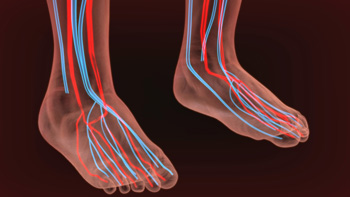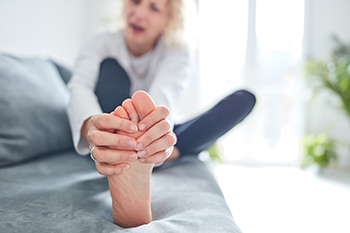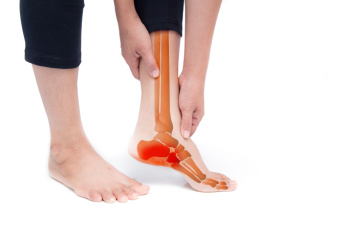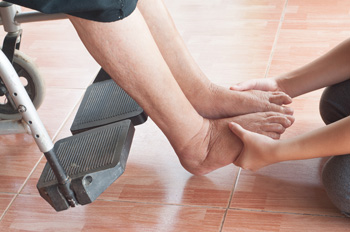Items filtered by date: September 2025
Managing Raynaud's Syndrome
 Raynaud’s syndrome is a condition which causes smaller arteries that supply blood to areas such as the skin of the toes to constrict in response to cold weather or stress. The constriction results in a temporary loss of blood flow to the affected areas, which may become cold, numb, or discolored. If you have Raynaud’s syndrome, it can be managed. Since cold temperatures are a known trigger of Raynaud’s, it is recommended that you protect your feet from the cold by wearing warm socks and shoes. Avoid wearing socks and shoes that are too tight, as these can further restrict your circulation. Regular exercise may improve circulation as well. For more information about managing Raynaud’s syndrome when it affects your feet, please consult with a podiatrist.
Raynaud’s syndrome is a condition which causes smaller arteries that supply blood to areas such as the skin of the toes to constrict in response to cold weather or stress. The constriction results in a temporary loss of blood flow to the affected areas, which may become cold, numb, or discolored. If you have Raynaud’s syndrome, it can be managed. Since cold temperatures are a known trigger of Raynaud’s, it is recommended that you protect your feet from the cold by wearing warm socks and shoes. Avoid wearing socks and shoes that are too tight, as these can further restrict your circulation. Regular exercise may improve circulation as well. For more information about managing Raynaud’s syndrome when it affects your feet, please consult with a podiatrist.
Poor circulation is a serious condition and needs immediate medical attention. If you have any concerns with poor circulation in your feet contact Monique Mitchell, DPM of Family Foot Centre. Our doctor will treat your foot and ankle needs.
Poor Circulation in the Feet
Poor blood circulation in the feet and legs is can be caused by peripheral artery disease (PAD), which is the result of a buildup of plaque in the arteries.
Plaque buildup or atherosclerosis results from excess calcium and cholesterol in the bloodstream. This can restrict the amount of blood which can flow through the arteries. Poor blood circulation in the feet and legs are sometimes caused by inflammation in the blood vessels, known as vasculitis.
Causes
Lack of oxygen and oxygen from poor blood circulation restricts muscle growth and development. It can also cause:
- Muscle pain, stiffness, or weakness
- Numbness or cramping in the legs
- Skin discoloration
- Slower nail & hair growth
- Erectile dysfunction
Those who have diabetes or smoke are at greatest risk for poor circulation, as are those who are over 50. If you have poor circulation in the feet and legs it may be caused by PAD and is important to make changes to your lifestyle in order to reduce risk of getting a heart attack or stroke. Exercise and maintaining a healthy lifestyle will dramatically improve conditions.
As always, see a podiatrist as he or she will assist in finding a regimen that suits you. A podiatrist can also prescribe you any needed medication.
If you have any questions, please feel free to contact our office located in Garden Hills, Nassau, Bahamas . We offer the newest diagnostic and treatment technologies for all your foot care needs.
Foot Cramps and Their Causes

Foot cramps are sudden, involuntary muscle contractions that cause sharp pain and tightness in the feet. They can indicate underlying issues, such as dehydration, poor circulation, nerve problems, or muscle fatigue. Symptoms include intense pain, hardening of the muscle, and temporary difficulty in moving the foot. Risk factors include overexertion, prolonged standing, inadequate stretching, or wearing unsupportive shoes. Common causes may also involve electrolyte imbalances, medical conditions like diabetes, or certain medications. A podiatrist can help by identifying contributing factors, recommending lifestyle changes, prescribing orthotics, and suggesting stretching routines to reduce recurrence. If you have frequent or severe foot cramps, it is suggested that you consult a podiatrist who can determine the cause, and offer effective treatment and relief solutions,
Foot Pain
Foot pain can be extremely painful and debilitating. If you have a foot pain, consult with Monique Mitchell, DPM from Family Foot Centre. Our doctor will assess your condition and provide you with quality foot and ankle treatment.
Causes
Foot pain is a very broad condition that could be caused by one or more ailments. The most common include:
- Bunions
- Hammertoes
- Plantar Fasciitis
- Bone Spurs
- Corns
- Tarsal Tunnel Syndrome
- Ingrown Toenails
- Arthritis (such as Gout, Rheumatoid, and Osteoarthritis)
- Flat Feet
- Injury (from stress fractures, broken toe, foot, ankle, Achilles tendon ruptures, and sprains)
- And more
Diagnosis
To figure out the cause of foot pain, podiatrists utilize several different methods. This can range from simple visual inspections and sensation tests to X-rays and MRI scans. Prior medical history, family medical history, and any recent physical traumatic events will all be taken into consideration for a proper diagnosis.
Treatment
Treatment depends upon the cause of the foot pain. Whether it is resting, staying off the foot, or having surgery; podiatrists have a number of treatment options available for foot pain.
If you have any questions, please feel free to contact our office located in Garden Hills, Nassau, Bahamas . We offer the newest diagnostic and treatment technologies for all your foot care needs.
When Nerves Stop Sending Clear Signals

Peripheral neuropathy is a condition that affects the nerves outside the brain and spinal cord, often impacting the feet first. Tingling, burning, or numbness may appear, making it difficult to sense temperature, pain, or even the feeling of the ground while walking. Some people describe the sensation as wearing invisible socks or gloves. Diabetes is one of the most common causes, but neuropathy can also result from vitamin deficiencies, certain medications, or circulation problems. Because the nerves are not working properly, small injuries may go unnoticed and progress into serious wounds or infections. Balance can also be affected, increasing the risk of falls. While symptoms vary from mild to severe, they should never be ignored. If you are experiencing changes in sensation in your feet, it is suggested that you see a podiatrist for a diagnosis and management.
Neuropathy
Neuropathy can be a potentially serious condition, especially if it is left undiagnosed. If you have any concerns that you may be experiencing nerve loss in your feet, consult with Monique Mitchell, DPM from Family Foot Centre. Our doctor will assess your condition and provide you with quality foot and ankle treatment for neuropathy.
What Is Neuropathy?
Neuropathy is a condition that leads to damage to the nerves in the body. Peripheral neuropathy, or neuropathy that affects your peripheral nervous system, usually occurs in the feet. Neuropathy can be triggered by a number of different causes. Such causes include diabetes, infections, cancers, disorders, and toxic substances.
Symptoms of Neuropathy Include:
- Numbness
- Sensation loss
- Prickling and tingling sensations
- Throbbing, freezing, burning pains
- Muscle weakness
Those with diabetes are at serious risk due to being unable to feel an ulcer on their feet. Diabetics usually also suffer from poor blood circulation. This can lead to the wound not healing, infections occurring, and the limb may have to be amputated.
Treatment
To treat neuropathy in the foot, podiatrists will first diagnose the cause of the neuropathy. Figuring out the underlying cause of the neuropathy will allow the podiatrist to prescribe the best treatment, whether it be caused by diabetes, toxic substance exposure, infection, etc. If the nerve has not died, then it’s possible that sensation may be able to return to the foot.
Pain medication may be issued for pain. Electrical nerve stimulation can be used to stimulate nerves. If the neuropathy is caused from pressure on the nerves, then surgery may be necessary.
If you have any questions, please feel free to contact our office located in Garden Hills, Nassau, Bahamas . We offer the newest diagnostic and treatment technologies for all your foot care needs.
Achilles Tendon Injuries in Athletes

Achilles tendon injuries are common among athletes due to repetitive stress, sudden increases in activity, poor conditioning, or inadequate footwear. These injuries can range from inflammation and small tears to full ruptures. They often cause pain, stiffness, and weakness in the back of the ankle, making it difficult to run, jump, or push off effectively during play. Recovery can be slow and may impact an athlete’s ability to perform at their best. A podiatrist can evaluate the extent of the injury and provide treatments, such as orthotics, targeted exercises, and advanced therapies to promote healing and prevent recurrence. If you have injured your Achilles tendon, it is suggested that you schedule an appointment with a podiatrist who can offer effective treatment solutions.
Achilles tendon injuries need immediate attention to avoid future complications. If you have any concerns, contact Monique Mitchell, DPM of Family Foot Centre. Our doctor can provide the care you need to keep you pain-free and on your feet.
What Is the Achilles Tendon?
The Achilles tendon is a tendon that connects the lower leg muscles and calf to the heel of the foot. It is the strongest tendon in the human body and is essential for making movement possible. Because this tendon is such an integral part of the body, any injuries to it can create immense difficulties and should immediately be presented to a doctor.
What Are the Symptoms of an Achilles Tendon Injury?
There are various types of injuries that can affect the Achilles tendon. The two most common injuries are Achilles tendinitis and ruptures of the tendon.
Achilles Tendinitis Symptoms
- Inflammation
- Dull to severe pain
- Increased blood flow to the tendon
- Thickening of the tendon
Rupture Symptoms
- Extreme pain and swelling in the foot
- Total immobility
Treatment and Prevention
Achilles tendon injuries are diagnosed by a thorough physical evaluation, which can include an MRI. Treatment involves rest, physical therapy, and in some cases, surgery. However, various preventative measures can be taken to avoid these injuries, such as:
- Thorough stretching of the tendon before and after exercise
- Strengthening exercises like calf raises, squats, leg curls, leg extensions, leg raises, lunges, and leg presses
If you have any questions please feel free to contact our office located in Garden Hills, Nassau, Bahamas . We offer the newest diagnostic tools and technology to treat your foot and ankle needs.
Essential Foot Care and Exercises for Older Adults

As people age, foot health becomes increasingly important for maintaining balance, mobility, and overall comfort. Common symptoms in elderly feet include stiffness, numbness, or instability. These are often caused by arthritis, reduced circulation, or muscle weakness. Feet may feel tired or unsteady, and daily activities can become more difficult. A podiatrist can assess changes in foot structure, gait, and strength, offering expert diagnosis and treatment options, such as orthotics, and footwear advice. Simple at-home exercises can also help. Towel scrunches strengthen the small foot muscles by pulling a towel with your toes. Arch lifts build strength and support in the midfoot, while a big toe stretch improves flexibility and alignment. These exercises promote better balance, reduce discomfort, and support joint health. To keep your feet strong and healthy as you age, it is suggested that you make an appointment with a podiatrist for personalized care and exercise guidance.
Proper foot care is something many older adults forget to consider. If you have any concerns about your feet and ankles, contact Monique Mitchell, DPM from Family Foot Centre. Our doctor can provide the care you need to keep you pain-free and on your feet.
The Elderly and Their Feet
As we age we start to notice many changes in our body, but the elder population may not notice them right away. Medical conditions may prevent the elderly to take notice of their foot health right away. Poor vision is a lead contributor to not taking action for the elderly.
Common Conditions
- Neuropathy – can reduce feeling in the feet and can hide many life-threatening medical conditions.
- Reduced flexibility – prevents the ability of proper toenail trimming, and foot cleaning. If left untreated, it may lead to further medical issues.
- Foot sores – amongst the older population can be serious before they are discovered. Some of the problematic conditions they may face are:
- Gouging toenails affecting nearby toe
- Shoes that don’t fit properly
- Pressure sores
- Loss of circulation in legs & feet
- Edema & swelling of feet and ankles
Susceptible Infections
Diabetes and poor circulation can cause general loss of sensitivity over the years, turning a simple cut into a serious issue.
If you have any questions, please feel free to contact our office located in Garden Hills, Nassau, Bahamas . We offer the newest diagnostic and treatment technologies for all your foot care needs.
